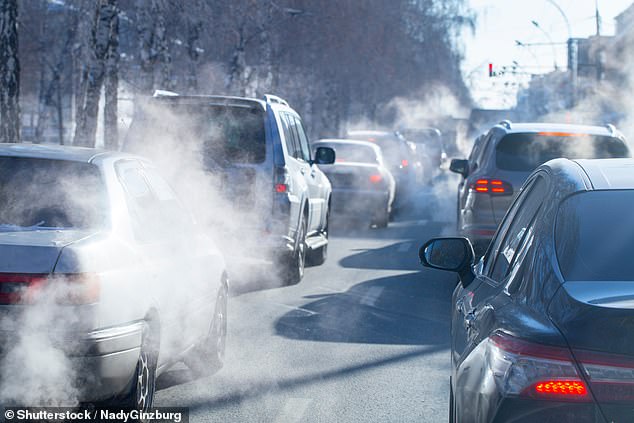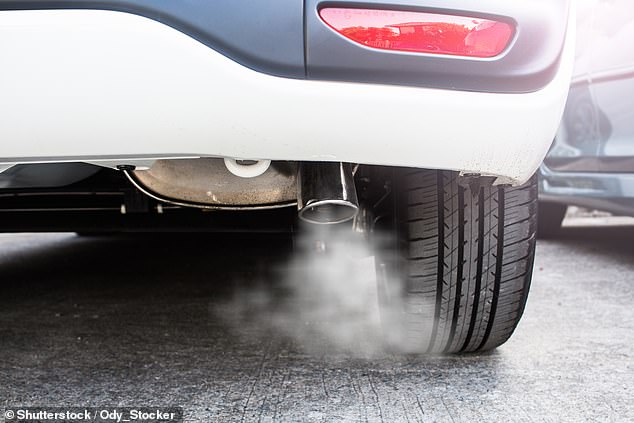The alarming link between air pollution and cancer will be revealed this week in new research, revealed exclusively to the Mail.
While air pollution’s link to lung conditions is well known, it is also directly implicated in cancer, including breast and prostate cancer, according to the review of 27 studies to be published in Anticancer Research on Friday.
Long-term exposure to air pollution increases the chances of developing breast cancer by 45 percent and prostate cancer by 20 to 28 percent, it says.
It increases the risk of dying from breast cancer by 80 percent and from any type of cancer by 22 percent compared to people who are not exposed to pollution.
This makes it “as important a risk factor as smoking, obesity and alcohol”, according to Professor Kefah Mokbel, one of the country’s leading breast surgeons who carried out the analysis.
The 27 studies were identified from a database of hundreds of peer-reviewed publications investigating the role of pollution in human diseases. Many of the studies included millions of patients who were followed for decades.

While air pollution’s link to lung disease is well known, it is also directly implicated in cancer, including breast and prostate cancer, according to the review of 27 studies.


Long-term exposure to air pollution increases the chances of developing breast cancer by 45 percent and prostate cancer by 20 to 28 percent, new research claims.
Of particular concern are particulate matter 2.5 (PM2.5), tiny bits of pollution (thinner than a human hair) that come from exhaust gases, manufacturing, wood stoves, cooking, smoking and vaping. .
They enter the lungs, then the bloodstream and circulate throughout the body.
“PM2.5 does not cause coughing, but there is growing evidence that when it enters the body, it can cause silent DNA damage that can lead to cancer,” Professor Mokbel told Good Health.
‘It can cause inflammation and oxidative stress, where the balance between free radicals [damaging molecules linked to disease] and antioxidants [which mop up free radicals] becomes unbalanced, causing damage to cellular DNA. Both are known risk factors for cancer.
‘PM2.5 also disrupts glands throughout the body that produce hormones. This is a particular concern for breast and prostate cancer, which can be hormone-driven.
‘At a time when we see increasing numbers of women with breast cancer, especially young women, people need to be aware that air pollution is a major risk factor for the disease.
“Long-term exposure to PM2.5 pollution not only increases the risk of breast cancer, but also appears to be linked to more aggressive disease and a worse prognosis.”
For example, research published in the journal Medicine in 2019, which combined the results of 14 studies involving more than one million breast cancer cases, found that for every 10 micrograms per cubic meter increase in PM2.5, the risk of dying from the disease increased by 17 percent.
Meanwhile, US research published last year in the journal Environmental Epidemiology, which analyzed the records of 2.2 million men, found that men diagnosed with prostate cancer were more likely to have been exposed to PM2.5 in the ten years prior to his diagnosis.
Other cancers that have been linked to PM2.5 exposure include stomach, lung, bladder, intestine, ovary and uterus.


Of particular concern are particulate matter 2.5 (PM2.5), tiny bits of pollution (thinner than a human hair) that come from exhaust gases, manufacturing, wood stoves, cooking, tobacco and vaping. .


Air pollution is “as important a risk factor as smoking, obesity and alcohol”, according to Professor Kefah Mokbel (pictured), one of the country’s leading breast surgeons who carried out the analysis.
Professor Mokbel recommends taking steps to protect yourself from the harmful effects of air pollution: ‘Avoid high pollution areas where possible, but don’t rely on masks – they offer little protection against this type of pollution.
‘I would also recommend eating a Mediterranean-style diet full of antioxidants to neutralize the effect of PM2.5.
‘This means eating fish; fruits such as pomegranates, strawberries, blueberries and tomatoes; vegetables like kale and broccoli; and drink green tea daily.’
He adds: “People should also be aware that vaping is not a safe alternative to smoking, and increasing evidence suggests it releases PM2.5 directly into the lungs.
‘It is important that people are aware of the profound health risks posed by air pollution. More research is needed, but the undeniable cancer risks associated with it underscore the urgency for policymakers to step up their efforts to advocate for clean energy initiatives.’
A Cancer Research UK spokesperson said: “Research to date has shown that there is only compelling evidence linking outdoor air pollution to lung cancer.”
‘But it’s important to keep this in perspective. Smoking causes around nine times more cases of lung cancer in the UK than air pollution.
“Not smoking, maintaining a healthy weight, sun protection, and reducing alcohol consumption are proven ways to reduce cancer risk.”
